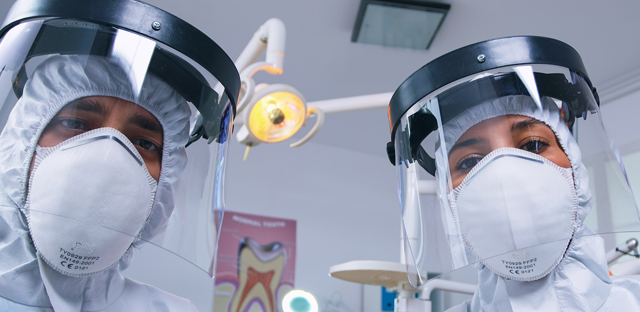Chris Thornhill: Does the dental profession have a trust issue?
Chris Thornhill explains how and why the sector needs to act now to win back hearts and minds.

Pain. Historically this has been the number one fear of patients anticipating dental treatment, but with NHS dental care seemingly as hard to find as the proverbial needle in a haystack, has that fear of pain now been usurped by the fear of costs?
As a young boy of a mother who started her first dental practice in the front portion of our own home, I grew up with some A* school security. It was common knowledge that I was the son of the local dentist and this afforded me freedoms from bullying that my weedy persona perhaps didn’t warrant. Why? Because no one was foolish enough to mess with the local purveyor of pain’s son. I wonder in these modern times whether I might have been granted such privileges.
There is now a bubbling undertone of patient concerns about unnecessary treatments, the use of expensive tech/equipment, a lack of transparency and a perceived lack of appointments. Perceptions of high cost alone are troublesome, but coupled with the aforementioned challenges is a trust problem that has the potential to be business critical. This is as true for practices and practice managers as it is for dental suppliers and manufacturers, as it’s a trust issue that runs all the way through the value chain. It’s crucial therefore that this trust is repaired now, before it’s too late.

To exemplify this point, one must not only look at the countless stories across social and mainstream media about horror DIY treatments, where people remove their own teeth at home using everyday tools to save money, but one must also look at how the opinion of UK dentistry has fallen, as the GDC’s 2024 Survey of the UK Public unearthed.
The most fascinating insight from the report was the fact that there was such a discrepancy in how respondents rated dental care in the UK, as a whole, vs their own experience of care. Whilst about two in three (65%) respondents gave their personal experience a rating of between 7 and 10, the equivalent proportion for the state of dental care in the UK as a whole was about one in three (34%). This confirms, in what is undoubtedly both a challenge and an opportunity, that there is a perception problem facing the UK dental industry.
So, what can you do about it? Here’s my three key communication-based areas to consider, to break through the noise and the cynicism and help you regain that trust and confidence with the UK public:
1. Increase Transparency on Pricing and Treatment Options – Whether NHS or private, being upfront, clear and transparent about your costs is crucial. Customers, regardless of what sector they’re shopping in, unanimously hate hidden charges. So, provide detailed treatment plans in writing and furthermore, help to inform and educate patients on what's covered under NHS vs. private care to reduce that anxiety.
2. Rebuild the Patient-Provider Relationship – People buy from people and people trust people. The GDC report suggests that people have a good opinion of their own care, so lean into this asset by promoting the continuity of care. This is enhanced by regularly seeing the same dentist, which builds familiarity and trust and can be furthered for the full value chain if dentists talk through and explain their choices of treatment and materials with their patients. And lean heavily on these ‘best-in-class’ relationships, to produce and promote patient testimonials, that are so valuable for building trust and credibility.
3. Promote Oral Health Education – Use your role in the dental value chain to educate, with accessible, plain-English explanations of treatments and solutions. Whether through creating your own content on your social media channels, website (blogs) or email newsletters, or going wider and working with influencers or schools, dispel the myths and be a leader in your community for promoting dental health and patient rights.

Ethical and transparent marketing gets right to the heart of these three key areas and is even more important in the private dental sector, where trust is at a premium. To supplement the aforementioned areas, consider accreditation programmes or “trust marks” to signal excellent patient care and transparency. One such mark that has gained significant traction across other sectors is that of B Corp.
The leading accreditation of ‘for profit’ companies that are deemed by B Lab to meet the highest standards of social and environmental performance, transparency, and accountability. While the dental sector was slow out of the blocks to recognise the value of B Corp, with the first UK dental provider accrediting only in 2023, there has since been a surge in applications and accreditations by forward thinking dental innovators who recognise the need to signal trust.
While the decline in trust in the UK dental profession will ultimately require a combination of systemic and professional solutions to fully right the ship, the three communication-based strategies detailed in this article can go a long way to repairing what is essentially a challenge of perception and therefore, well within your grasp to tackle.
Author:
Chris Thornhill says he is on a “mission to clean up marketing and put ethics right at the forefront”. When Chris and co-founder Jen Bayford set up Growth Animals, they were inspired by a mission to help businesses grow their bottom line and positive impact through marketing that is helpful and inspiring, not manipulative or intrusive. They are now the Brighton based, B-Corp Certified marketing agency, who help SMEs to step up their marketing.
For more information, visit www.growthanimals.com or https://www.linkedin.com/in/christopherthornhill/





















